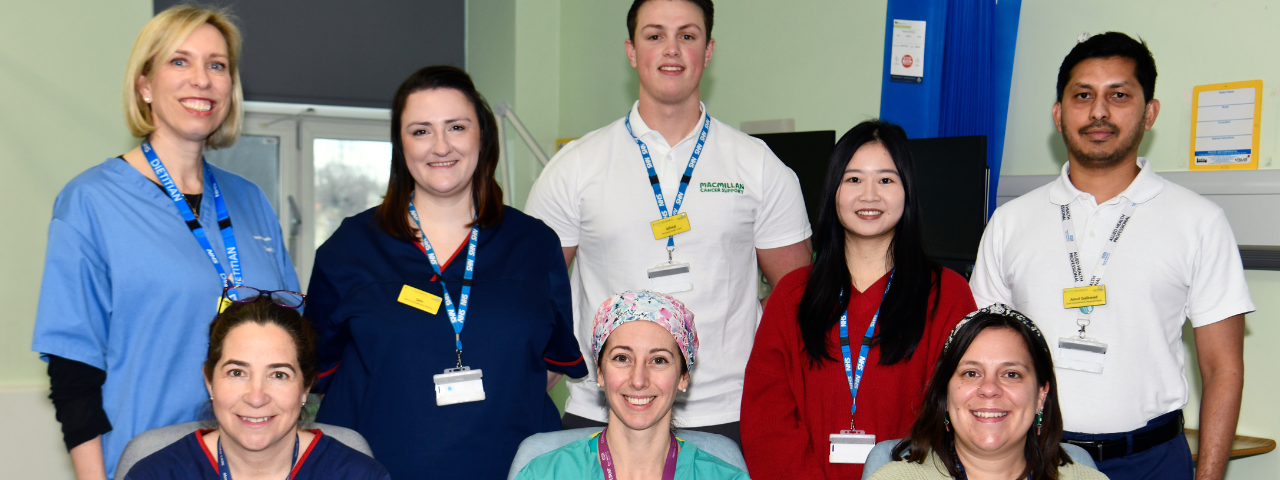
Cancer Prehabilitation
Having an operation challenges your body and mind, and prehabilitation is the process of getting physically and mentally ready for surgery.
There is lots of evidence that shows that when people make an effort to improve their physical and mental health before an operation, it can really help them to recover faster, have fewer setbacks and can potentially improve their long-term health and wellbeing.
Whilst your body is healing, your heart and lungs need to work harder to provide the oxygen and nutrients it needs to recover.
Improving your physical fitness trains and prepares your body for the extra work it will need to do after the operation, which means you’ll get over the surgery and back on with your life faster.
It’s not just any activity (although any movement you do is good for you), the key is to do some exercise that gets you out of breath 3 times per week, because it is the getting out of breath that is trains your heart and lungs to work a bit harder.
Getting more active has other benefits too; it helps reduce stress and anxiety, improves your mood and can even reduce tiredness.
The Prehab team have done some videos of exercises that you can follow at home, please see below:
Please feel free to use the exercises if you are confident enough and physically able to do them. If unsure then please do not attempt to do them or consult your Physiotherapist or Doctor. Prehabilitation team or Royal Berkshire Hospital won’t accept any liability for any injuries from attempting the exercises. Always perform a risk assessment of the environment you will be exercising in.
Physio Introduction
https://www.youtube.com/watch?v=UcO3r_MgrBE
Warm-Up Exercises
https://www.youtube.com/watch?v=WQbj61g5AL0
Strength Exercises
Upper Body - https://www.youtube.com/watch?v=FCGN2i1n6U8
Core - https://www.youtube.com/watch?v=d_ha_rOjQwo
Lower Body - https://www.youtube.com/watch?v=vrwY-94Jp2g
Cool Down
https://www.youtube.com/watch?v=F2OQCJzEfts
You can find further useful info on physical activity / exercise and cancer on the following links:
https://www.selca.nhs.uk/patients-and-carers/diagnosis-and-treatment/physical-activity
The following exercises can be done seated or standing for one minute each, to build a five minute workout:
Prehabilitation is about improving your nutrition, taking action to help you tolerate your treatment, have fewer side effects or cope better, which can help you recover quicker.
A balanced diet needs to include food from all the food groups to make sure your body works well, these include beans, pulses, fish, eggs, meat and other proteins, starchy foods, fruit and vegetables and dairy foods such as milk, yoghurt and cheese or dairy alternatives.
Ideally you should eat enough calories (energy) and enough protein to keep your weight steady and keep as strong as possible. For more information on nutrition to prepare for treatment, please see this Prehabilitation leaflet.
If you are underweight or have lost weight unintentionally then you may be advised to try and gain a little weight. Please find below some written information which may help Cancer and weight loss - the building-up diet.
If you are overweight, losing weight at this time may not be recommended, but instead ensure you avoid gaining more excess weight, while still getting all the nutrition your body needs. The following link may support you to make healthy choices before your treatment.
The news of a cancer diagnosis is an extremely difficult time for you and your family. It can bring about many psychological, emotional, spiritual and physical challenges for those being treated for and living with and beyond their cancer.
It is understandable therefore that many will try to help fight cancer or alleviate treatment side effects through changing their diet. However, if you, or a relative or friend are planning this, it is important to know if you are making the right or wrong changes. The following information may help you to navigate some of the dietary information you may receive.
Having an operation is a stressful time in anyone’s life and it is natural to feel worried. Managing your anxiety, encouraging positive thinking and developing your coping skills may have a positive impact on your recovery and outcome after surgery.
Sleep is also an important component of your recovery, and so if it’s something you struggle with, it’s important to try to address it before your operation, so you can benefit from the recovery benefits of sleep after surgery.
Stopping smoking is the best thing you can do to reduce your risk of problems after an operation.
The world health organisation suggests that you can reduce the complications from surgery by up to 50% by stopping smoking.
If you stop smoking:
- you increase blood flow to the tissues that are healing, reducing the risk of infection,
- you reduce the strain on your heart, reducing your risk of a heart attack and it also
- you improve the efficiency of your lungs, reducing the chance of breathing problems after surgery.
There are many support options available to you, located within our local stop smoking service: Stop Smoking Berkshire.

